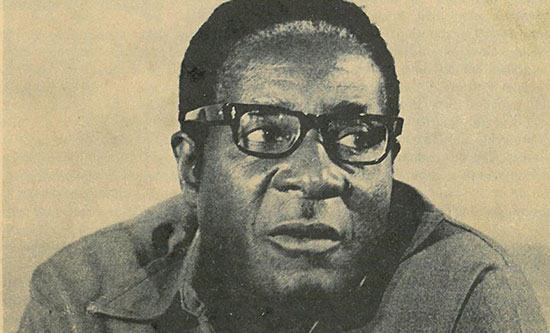
Fight Racism! Fight Imperialism! No 2 – January/February 1980
The following interview was given to Fight Racism! Fight Imperialism! by Comrade President Mugabe — President ZANU — Patriotic Front. The interview took place at Heathrow Airport on [22 December 1979] — just before President Mugabe flew out of Britain. It is the last interview he gave before leaving Britain.
Fight Racism! Fight Imperialism!: What positions would you like organisations in this country to take on the settlement, and what would you like us to do over the coming weeks and months in your support?
Comrade President Robert Mugabe: The struggle hasn’t ended. It’s only just begun in our view. In the sense that if all goes well during the elections and we emerge as the government there will still be another form of struggle. But there’s going to be lots of work in reconstruction, resettling people. In the initial period we will expect all the support groups we have here in Britain and elsewhere to concentrate their efforts in enabling us to resettle our people. There are many refugees, if not more refugees inside the country than outside the country. There is also the question of working to aid us at the present moment when we are campaigning for elections.
FRFI: What we are particularly concerned about is the role of Britain in Zimbabwe and South Africa in particular and we believe that the possibility of intervention of British troops or South African troops is one that we have got to fight against. What’s your comment on that?
Comrade President Robert Mugabe: Yes, certainly we must combine forces just now. South African troops are within the country. We raised this matter yesterday with Mrs Thatcher and Lord Carrington when we met them and we wanted to get from them a definite commitment that they were going to get the South African troops out. They were not that convincing. They said that as far as they knew the South African troops were not in the country. There is the possibility that these troops will be used against us if we are victorious. There is also the possibility that in fact the South Africans are there at the invitation of Britain, because Britain is hesitating to remove them. Hence there is a need for us to combine forces and demand through all political platforms, through all media, the withdrawal of South African troops and action, definite action, by Britain to get those South African troops out.
FRFI: If you win the election, as we think you will win the election, and General Walls and the British act with the South Africans to overthrow your power, do you envisage going back to the armed struggle?
Comrade President Robert Mugabe: The armed struggle is not ending just now. We are upholding a ceasefire. We have our arms with us. If anybody attacks us we will readjust and mobilise ourselves for action immediately. That will be the end of the ceasefire if it happens during the ceasefire period. If it happens after we have won the elections, naturally we will put up a resistance. We will defend our victory through armed struggle. We will have to do that.
FRFI: In the elections that are taking place, is the Patriotic Front standing as separate organisations?
Comrade President Robert Mugabe: The Patriotic Front is two organisations under a banner, and we cannot create one party overnight. It takes time. Even if we wanted it, this is not the time to do it; it would raise more contradictions in the Patriotic Front. We will fight the election in the most effective way which ensures that the two parties are there, but we can agree on pooling our results and forming a coalition. There are many, many possibilities, but certainly the two parties will maintain their identity.
FRFI: During the talks at Lancaster House, there was a great failure of the anti-imperialist forces in this country to give you support. Do you think this made a difference?
Comrade President Robert Mugabe: Yes, the anti-imperialist, forces in the country here, I think are not that strong. The capitalist forces, the reactionary forces are far more formidable, far better organised. But we would have wanted to hear the voice of the anti-imperialist forces, those who espouse the cause of freedom, the cause of independence, everywhere. There was not that failure as such, but it is a state of affairs which continuously exists in the country. It did not start with our coming to Lancaster House. I think that the movement is weak in this country, much weaker than it is in Italy for example, much weaker than it is in Spain, much weaker than it is even in Germany, although there the groups are small they are very vociferous and you get them speaking loudly and organising. We expected anyway that the democratic forces which have agreed with us in this country would have rallied behind us. But it was a difficult struggle. Even some of our friends, not only here, but in the international community, in Africa as well, were beginning to show weakness and their weakness, did not lend support to us and we found ourselves weak negotiators at various stages.
FRFI: Something which concerns us greatly is the Irish struggle against British imperialism. Do you have any comments to make on that struggle?
Comrade President Robert Mugabe: Our view is that we would want to see the situation in Ireland resolved, but we do not intervene in that situation for tactical reasons. Our view is commonly known that imperialism wherever it is must be fought and that justice must be done in Ireland.




